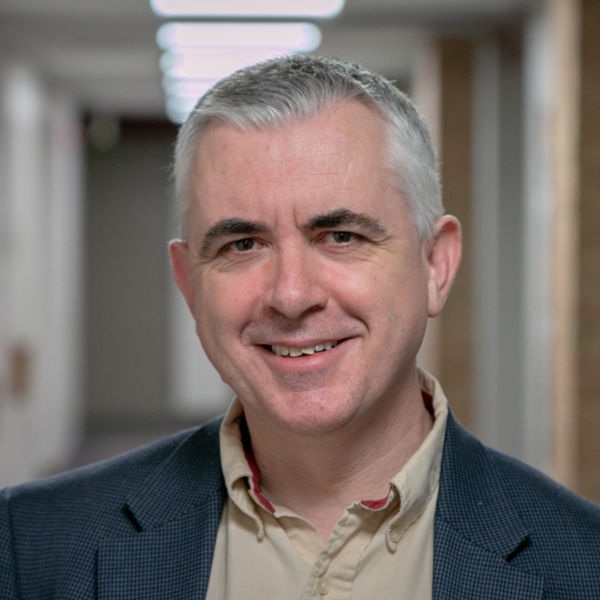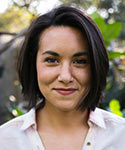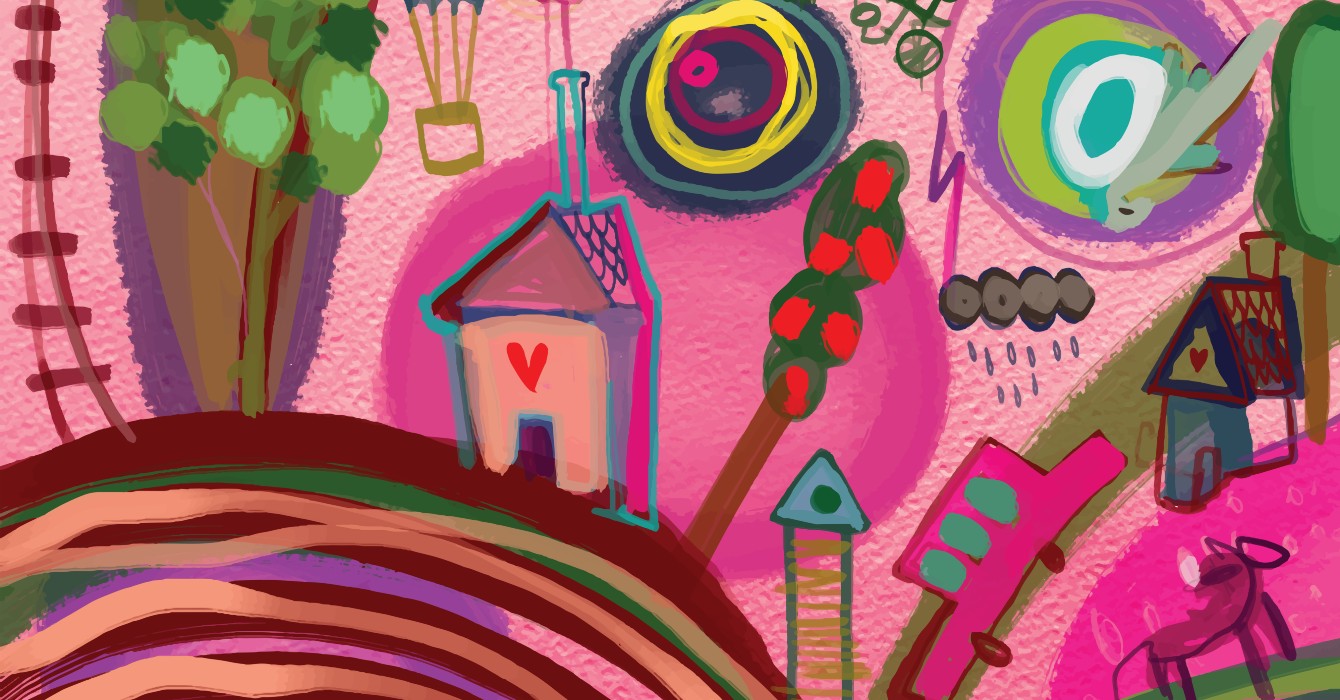Felix Silva, a student at the University of Texas Rio Grande Valley (UTRGV), recognizes the contradictions of his hometown of Reynosa, Mexico.

UTRGV BSM among 2018 winners
Leadership Education at Duke Divinity recognizes institutions that act creatively in the face of challenges while remaining faithful to their mission and convictions. Winners receive $10,000 to continue their work.
“It’s a beautiful place, but a lot of bad things happen.”
Reynosa is just a few miles away from his school’s campus in Edinburg, Texas, and Silva returns home to be with his parents every weekend. This short journey is fraught with the usual rigmarole of border processing, but on the Mexico side, it’s also fraught with the threat of drug cartel violence. Reynosa ranks among the most dangerous cities in Mexico -- and indeed the world.
Silva, 21, describes shootouts he’s seen -- one in front of a bus station, another from his car as he waited at an intersection. Asked whether he’s ever had a face-to-face encounter with someone from the cartels, Silva looks down at the ground. “Only once. It was a really bad experience.”

Silva’s college journey has been exceptional, and it certainly has been difficult. But as a member of the Baptist Student Ministry (BSM), a thriving Christian college group at UTRGV, Silva hears more about the “exceptional” part.
“I think of him as a guy that is learning to be cross-cultural and live in two worlds,” said Robert Rueda, the director of the BSM. “He struggles with having to go [back and forth], but I tell him, ‘This is incredible. This is what makes you special. God can use this.’”
In Silva, a young man trying to build a secure life in a complex border region, Rueda sees the seeds of greatness. That is Rueda’s strategy for this collegiate ministry: helping students see life on the border as ideal training for lives of significance.
Robert Rueda has a hopeful vision in a situation that many might see as intractable. How could you cultivate such an Easter vision, either inside or outside your organization?
The border region that UTRGV students such as Silva have to navigate is a transitional place in a transitional era. The border is the locus of some of our nation’s fiercest political battles -- a wedge issue for some, a rallying cry for others. Family separation policy and President Trump’s border wall make national news, but here -- where the immigrant processing center and barrier construction are in plain sight -- they are intensely local concerns.
Still, Rueda doesn’t see the border as an issue. He sees it as an ideal incubator for the kind of leaders we are going to need for the future of the country. And he has designed the BSM at UTRGV to help train them for that future.
“Having to work so much, having to be undocumented -- we’re trying to help them see those things as assets,” Rueda said. “This makes you a person that packs a punch. You can do so much with it. You have a story.”

Life in context
Texas’ Rio Grande Valley, which stretches more than 100 miles along the edge of the southern United States, is booming. Fast-growing towns dot the landscape, with interstates, sprawl, multiplexes and shopping aplenty. Costco, Chipotle, Home Depot -- you name it. There also are well-appointed colleges like UTRGV, which has two main campuses along with other teaching sites and labs across the entire breadth of what Texans call “the Valley.”
But as the threshold for millions of people entering the U.S. in search of a better life, the Valley also bristles with strife. The poverty rate is twice the national average, and household income trails the national median by more than $25,000.
Rueda, 45, has lived here since 2005, when the Baptist General Convention of Texas hired him upon graduation from Baylor University’s Truett Theological Seminary. Baptist Student Ministry is a mainstay of the convention’s collegiate effort, but its presence in the Valley was dwindling at that time, and convention staff were looking for a Spanish-speaking minister to salvage the chapter at the UT campus in Edinburg.
Not just Spanish-speaking, though -- also Hispanic-thinking.
“They wanted someone who could operate in two cultures,” said Rueda, who was born and raised in Oaxaca, Mexico, and first came to the U.S. to attend Bible college at the Baptist University of the Americas in San Antonio.
When Rueda arrived in the Valley, he found a BSM with about six active students left. His initial strategy was from the collegiate ministry playbook, he said.
“I remember thinking, ‘Let’s just teach the Bible, hold Bible studies, have a worship gathering, attract people with food,’” he said. He tried that for a while and saw limited growth.

A couple of years into the job, Rueda decided to take students on a service project to the colonias -- the ramshackle communities that function as a first home for many recent arrivals.
In Texas, colonias are home to around 500,000 people. Unincorporated, the colonias often lack basic services like drinking water and paved roads. Residents build homes out of whatever they can -- cardboard, cinder blocks, plastic -- and add to their structures a little at a time.
The colonias were a natural destination for a Christian college ministry looking to do some good. And that’s all Rueda had in mind: get students to go on a mission and serve others.
“So we show up and I start sending the students out into the colonia,” he said. “I was directing them -- ‘Go knock on doors! Get some sports going! Attract the kids out!’ -- when one of my students came up to me and said, ‘Can I go visit my parents?’”
Rueda felt annoyed. “We’re just getting started,” he thought, “and already she wants to leave?” But before he could tell her no, she continued.
“My parents’ house is two blocks from here,” she said. “This is where I live.”
In that moment, Rueda recalls, “I was thunderbolted.” A switch flipped.
“I had only seen the students at the dorms, in the cafeteria. All of a sudden, I was able to see not a temporary context but a life context.
“That transformed our ministry,” he said. “These students seem like the normal, typical college student. But they have so many layers.”
Rueda shifted his priorities. Instead of “trying to tell students the story of Jesus,” he said, “I started developing ways of hearing their story.”
Rueda had an "aha" moment when he saw his students in their home context. What might you do to see your work in new ways?
As students came his way, he asked them questions about how they grew up. He asked about their parents. He asked how long the family had been in the U.S. He learned what life was like for the student who grew up picking strawberries, the student whose father had just been deported, the student who felt trapped, unable to move between her new home and her old one.
Many students were quite literally trapped -- between the U.S.-Mexico border and the border checkpoints a few miles north. That’s a common phenomenon; many families who make it into the United States cannot get very far, because they cannot legally pass through a secondary checkpoint positioned across the highway. The U.S. Border Patrol stops traffic at these interior checkpoints and questions drivers and passengers about their citizenship status and the contents of their vehicles.

“Our families came from Mexico, and some of them can’t go back,” said Lizzette Garcia, 22, one of the BSM students. “But they can’t move forward. We’re just stuck here.”
The more Rueda talked to students, the more he realized that the purpose of his ministry was staring him in the face: the overall well-being of these very students, with their very needs. Almost the entirety of UTRGV’s 28,000 students hail from the Valley, and while their struggles are not all the same, Rueda noted a typical mentality: Maybe we’re too stuck. Maybe we’re too poor. Too Hispanic. Too from-the-Valley.
What the BSM needed to do, Rueda realized, was “really stand with these students.” Not just teach them the Bible but also help them develop the capacity to address whatever needs they faced. “They don’t know how to do their FAFSA, how to apply for scholarships. How to talk to their parents. How to have conversations with adults” -- especially, he said, the white professionals they’re likely to encounter throughout life in the U.S.

Rueda realized something else, too -- that he had to flip the script for these students, to invert their whole sense of self. Their struggles were undeniable. But what if they could see those struggles as a source of power? What if their roadblocks could become a competitive advantage?
Rueda focuses on his students’ assets -- their strength and resilience -- instead of looking at what they lack. Can you flip the script with your constituents?
Thus, even as Rueda worked to help students overcome their individual challenges, his message to them began to shift: Your struggle is your strength.
Building the ministry
To put these ideas into practice, Rueda, his associate director and student volunteers began to work on what he calls “mobilization” -- running the ministry through the students, pushing them to get out on the campus and make the BSM an active, visible part of student life.
With the students’ input, they set a goal of involving 10% of the UTRGV student body in the ministry -- a lofty goal of 2,800 students. They used tools like the Business Model Canvas, a strategic planning template popular among startups. They distributed the plans not just through a core leadership team but through all the students in the ministry. Rueda’s message to every student was the same: Just by showing up and saying yes (or even: yes?), you can help lead the way.

BSM students spread themselves around the campus in multiple ways -- pop-up nail salons, coffee bars and bubble tea stands, all pay-as-you-can; regular games of pickup soccer and Ultimate Frisbee; a free PB&J lunch on Thursdays that has now grown to feed hundreds of students each week. After percolating for a few years, these activities have become a mainstay of the BSM culture on the campus.
Rueda estimates that the UTRGV ministry now touches around 1,200 students per week, with 300-400 regularly involved in BSM activities. Some are lifelong believers; some are converts. Others, Rueda said, just get involved because of the relationships and find themselves drawn to the faith along the way.
The BSM programming at UTRGV includes standard college ministry fare. There are 20-plus Bible studies each week -- with plans for 50 next year -- and students are sent on short-term mission trips each spring break and summer to destinations in the U.S. and abroad.
The BSM programs at UTRGV might look like any campus ministry, but they are designed to teach students how to navigate a world very different from the one they are used to. What ways of seeing and working do your programs teach that can be practiced for years to come?
But at UTRGV, these efforts are “much more strategic than just an institutional box to check,” said Elizabeth Le'anani Coffee, a colleague of Rueda’s at the Baptist General Convention. “[Rueda] has this vision that’s far beyond what you see on the surface. He has this crazy intuition for what it takes to develop leaders.”
That intuition starts with being bullish about every student’s potential, no matter the student’s roots.
“Whoever they are, they’re ready,” Rueda said. “One girl came to me -- she said all she had ever known was working in a chicken factory. ‘That’s the only experience I have. You think God can use that?’
“I said, ‘Yeah, of course he can.’ She ended up going to Russia and serving in an orphanage.”
Nio Deleon, 20, is a junior criminal justice major who says the BSM helped him find his voice.
“Two or three years ago, I couldn’t even do presentations in class,” he said. “My hands would be shaking; I would be nervous. I couldn’t even do it.”
But in the BSM mix, he’s had to offer his fellow students free lunch and coffee on campus, and he’s had to teach Bible studies. During spring break this year, he was part of a team that offered a safe shuttle ride to partying students in South Padre Island.
“I started to be nervous,” he said, “but then I realized -- this is what we do on campus all the time, just talk to people. Now I can easily do it.”
Deleon sees these leadership skills embedding in his life for good. He’s working with kids at both his school and his church, and he is hoping to become a basketball coach in the Valley.
Rueda’s vision is to build countless lives like these: well-formed people utilizing their strengths, serving their communities.

A vision for the Valley -- and the nation
All the BSM activity happens on a shoestring budget -- modest salaries for Rueda and his associate director from the Baptist General Convention, plus occasional support from a handful of benefactors and churches.
With the help of Coffee, who serves as a regional coordinator for the Baptist General Convention, Rueda has also obtained targeted grants to try experimental concepts. Last fall, they created an opportunity for students with business ideas to pitch to investors who could give them feedback or even funding.
They’ve also launched a mentorship program designed to put students in relationship with professionals outside the Valley -- and crucially, give those professionals perspective on the kinds of leaders who are emerging in the border region.
It’s a lot for a small staff, and funding such a ministry is an ongoing challenge, but Rueda seems to be vivified by the work. “I am energized all the time,” he said.

Coffee, whose family is from Hawaii, draws on her heritage to describe Rueda.
“The word for what he has is ahonui -- having all the breaths it takes to get from one place to the next,” she said. “He has what it takes to walk alongside students, not only for them as individuals, but for the story all of them are telling collectively about what it means to be a person of faith alongside the border.”
And his vision for these students is not limited to the present. He sees them “not for who they are today but for who their grandchildren will be,” Coffee said. He also thinks about how the Valley and South Texas are, demographically, a picture of the future of large swaths of the nation.
“A lot of people think that the Valley is behind,” Rueda said. “I feel in many ways it is ahead.”
Rueda is looking two generations into the future when he thinks about the students he is teaching today. How are you investing in a new generation of leaders for a changing world?
Last year, the U.S. Census Bureau released data indicating that Texas could be a Hispanic-majority state as early as 2022. As the Hispanic population grows, it will hold more wealth and political influence, and it will have more say in the future of the country.
Rueda aims to prepare these students for that future. In seeing to their spiritual formation and ensuring that they embrace their education, he can help form people who will become significant community leaders -- leaders who live not just for themselves but for the common good.
“I have a vision for the nation,” he said. “We are going to be a majority. What kind of majority are we going to be?”
Questions to consider
Questions to consider
- Robert Rueda has a hopeful vision in a situation that many might see as intractable. How could you cultivate such an Easter vision, either inside or outside your organization?
- Rueda focuses on his students’ assets -- their strength and resilience -- instead of looking at what they lack. Can you flip the script with your constituents?
- There was an “aha” moment when Rueda saw his students in their home context. What might you do to see your work in new ways?
- The BSM programs at UTRGV might look like any campus ministry, but they are designed to teach students how to navigate a world very different from the one they are used to. What ways of seeing and working do your programs teach that can be practiced for years to come?
- Rueda is looking two generations into the future when he thinks about the students he is teaching today. How are you investing in a new generation of leaders for a changing world?















